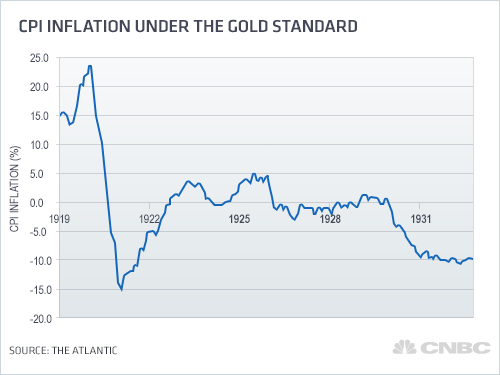Is There a Case for Gold ?
— December 11, 2016Gold is a polarizing topic; everyone has an opinion about the yellow metal, but it’s rare to find people who are rational in their analysis.
I never allow myself to have an opinion on anything that I don’t know the other side’s argument better than they do. – Charlie Munger
Regardless of which side you are on, it would be wise to follow Munger’s advice.
What is Gold?
 Gold is a chemical element with the symbol Au and the atomic number 79. In its purest form, it is a bright, slightly reddish yellow, dense, soft, malleable and ductile metal. Chemically, gold is a transition metal and a group 11 element. It is one of the least reactive chemical elements and is solid under standard conditions. The metal, therefore, occurs often in free elemental (native) form, as nuggets or grains, in rocks, in veins and alluvial deposits. – Wikipedia
Gold is a chemical element with the symbol Au and the atomic number 79. In its purest form, it is a bright, slightly reddish yellow, dense, soft, malleable and ductile metal. Chemically, gold is a transition metal and a group 11 element. It is one of the least reactive chemical elements and is solid under standard conditions. The metal, therefore, occurs often in free elemental (native) form, as nuggets or grains, in rocks, in veins and alluvial deposits. – Wikipedia
Gold’s usefulness is derived from a diversity of unique properties. Gold conducts electricity, does not tarnish, is very easy to work, can be drawn into wire, can be hammered into thin sheets, alloys with many other metals, can be melted and cast into highly complicated shapes, has an excellent color and a brilliant luster. Gold is a metal that occupies a special place in the human mind.
About 78% of the gold consumed each year is used in the manufacture of jewelry. Apart from jewelry Gold is also used in the production of electronic devices like cell phones, computers, etc. and aerospace industry. Gold also finds use in dentistry and medicine.
However, From the time of the Egyptian Pharaohs to the voyage of Columbus to the New World and beyond, gold has been revered as a symbol of wealth and prosperity. Gold has also been used as currency and as a way to prop up the fiat money of various countries. – Investopedia
Pro Gold
People in this camp are labeled as Gold bugs. However painting them with a broad brush is not fair. In fact, there are different theories, motivations, and philosophies that lead to their preference for gold. If you want to understand their “case for gold” you have to understand their view of the world and their background and experiences.
The anti-establishment brigade
This group represents the fiscal conservatives and libertarians who believe in small governments and individual freedom.
Fiscal conservatism is a political-economic philosophy regarding monetary policy and financial responsibility advocating low taxes, reduced government spending, and minimal government debt.(Source : Wikipedia )
Libertarians share a skepticism of authority; however, they diverge on the scope of their opposition to existing political and economic systems. Various schools of libertarian thought offer a range of views regarding the legitimate functions of state and private power, often calling to restrict or to dissolve coercive social institutions. (Source : Wikipedia )
Ron Paul is a leading figure in this group. He is an American author, physician, and former politician. He sought the presidency of the United States: as the Libertarian Party nominee in 1988 and as a candidate in the Republican primaries of 2008 and 2012. Paul is a critic of the federal government’s fiscal policies, especially the existence of the Federal Reserve and the tax policy.Senator Paul is a staunch supporter of the gold standard.
The gold standard would keep you from printing money and destroying the middle class. Every country where you have runaway inflation, there’s no middle class, you have a large poor class, and a lot of wealthy people. Today we have a growing poor class, and we have more billionaires than ever before. So we’re moving into third world status – Ron Paul
The Dooms-dayers
This camp has a diverse population including traders, speculators, anarchists, professional forecasters, authors, conservatives, and economists. Some of them are considered as perma-bears.
A perma-bears is somebody who is always negative about the future direction of the markets and economy in general, no matter what. There are two parts to this word that will help to let you know its meaning: “perma” – permanent. “bear” – someone who believes in a falling stock market, or “bear” market. (Source – Davemanul.com)
Some of the familiar names in this group are Peter Schiff, Jim Rickards, Jim Rogers, Marc Faber, Robert Kiyosaki and Gerald Celente. They are famous for their dire predictions about the economic collapse and fall of United States as a world power. However, all of them are huge proponents of gold. Apart from gold, this group has one more thing in common, and that’s books. They are all authors of best-selling books and have a huge fan following among their readers. They usually publish books frequently, and some of them like Robert Kiyosaki publish more than one every year. Following quotes from these authors summarizes their views about gold and their world view.
The United States is like the Titanic, and I’m here with the lifeboat trying to get people to leave the ship… I see a real financial crisis coming for the United States. – Peter Schiff
If you were smart in 1807, you moved to London. If you were smart in 1907, you moved to New York City. And if you were smart in 2007 you move to Asia.– Jim Rogers
It may be too late to save the dollar, but it is not too late to preserve wealth. We live in an artificial monetary system that has reached its end stage. Gold and silver have, uninterruptedly to this day, continued to be the universal currency of the commercial and civilized world – James Rickards, The Death of Money
The primary reason I’m in real estate, oil, gold, and silver is that the U.S. dollar has become the peso the world. It’s becoming more and more worthless as the U.S. is the world’s biggest debtor nation – Robert Kiyosaki
Given all the money printing that is going on globally – and not just in the US – and given that the total credit as a percent of the advanced economies is now 30% higher than in 2007 before the crisis hit, I think that gold is good insurance. – Marc Faber
The Pragmatists and Practitioners
The final group who is pro gold are investors and fund managers. This group doesn’t share the apocalyptic view of the world discussed before. They see gold as an insurance against inflation and market risks. They don’t speculate and consider their position in gold as a cost of hedging against a steep decline in the value of their portfolio. Some of the investors in this group are accomplished fund managers like Ray Dalio, Bill Gross, Kevin O’Leary and Stanley Druckenmiller.
If You Don’t Own Gold, You Know Neither History Nor Economics – Ray Dalio
I always have 5% of my portfolio in Gold; this is insurance, not an investment – Kevin O’Leary
We ( the United States and Federal Reserve) are running an unnecessarily loose monetary policy, and history shows it may have long-term consequences down the road. – Stanley Druckenmiller
Against Gold
The list of investors and economists who have an unfavorable opinion about gold is long and includes some of the most respected public figures and investors like Warren Buffett, Charlie Munger, George Soros, Bill Ackman and many economists including John Maynard Keynes.
John Maynard Keynes (5 June 1883 – 21 April 1946) was a British economist. His ideas fundamentally changed the theory and practice of macroeconomics and the economic policies of governments.Keynes called gold standard a barbarous relic and argued that it was no longer a net benefit for countries such as Britain to participate in the gold standard.(Source: Wikipedia)
“In truth, the gold standard is already a barbarous relic. All of us, from the Governor of the Bank of England downwards, are now primarily interested in preserving the stability of business, prices and employment, and are not likely, when the choice is forced on us, deliberately to sacrifice these to outworn dogma, which had its value once, of 3 pounds, 17 shillings, 10 1/2 pence per ounce. Advocates of the ancient standard do not observe how remote it now is from the spirit and the requirements of the age.” A Tract on Monetary Reform, 1924- John Maynard Keynes
In a recent poll of top economists published by Professor Richard Thaler, none of the economists endorsed the idea of a return to gold standard. Some of the reasons are listed below.
1. The Reserve Bank (Central Bank) can’t fight recessions because the monetary policy decisions will be based on how much gold a country has. This, in turn, depends on trade balance and on how much gold can be mined.
2. Mapping currency to gold requires raising interest rates when gold is scarce, regardless of the state of the economy. This inflexibility in the monetary policy was the primary cause of the Great Depression. The central banks were forced to tighten their fiscal policy at the worst possible moment. It was evident that the sooner a country abandoned the gold standard, the sooner it began recovering.
3. Central banks are prevented from printing currency and from running deficits when the economies required them.
4. Countries do not have a proportionate distribution of gold mines, i.e. some countries might be rich in gold, and some might be depleted in gold. It extremely tough for the central bank to manage the money supply, hence affecting the overall economy.
5. Price stability: The belief that if governments can’t spend or create too much money, prices should be stable is flawed. The below chart which shows the CPI inflation when gold standard was adopted
It is clear that the prices are unstable and fluctuates as the trade balance changes or the amount of gold varies. Economists believe that the gold standard might guarantee price stability in a very long run, and is not a good idea for short term policies.
When interest rates are low, we have conditions for asset bubbles to develop, and they are growing at the moment. The ultimate asset bubble is gold. – George Soros
Conclusion
Both sides of the gold camp have some of the smartest investors and economists, and it’s not wise to ignore their case for and against gold.
For Gold:
It’s hard to deny the temptation governments across the world face to print their way out of their financial troubles. Gold had always had value to humans, even before it was money and is demonstrated by the extraordinary efforts made to obtain it. Prospecting for gold was a worldwide effort going back thousands of years, even before the first money in the form of gold coins appeared about 700 B.C. When people lose faith in government they will turn to what they consider a reliable store of value to preserve their wealth.
Against Gold
One problem with a gold standard is that the size and health of a country’s economy are dependent upon its supply of gold.It’s not reliant on the resourcefulness of its people and businesses. Countries without any gold are at a competitive disadvantage.
The gold standard makes countries obsessed with keeping their gold. They ignore the most important task of improving the business climate. During the Great Depression, the Federal Reserve raised interest rates. It wanted to make dollars more valuable and prevent people from demanding gold. But it should have been lowering rates to stimulate the economy. (Source: Econlib, The Great Depression)
In a rare video, Professor. Milton Friedman explains the benefits and drawbacks of both gold standard and Keynesian policies.
Milton Friedman (July 31, 1912 – November 16, 2006) was an American economist who received the 1976 Nobel Memorial Prize in Economic Sciences for his research on consumption analysis, monetary history, and theory, and the complexity of stabilization policy.
Finally, the value of gold is literally “in the eye of the beholder”. When an asset’s price depends on what others are willing to pay rather than the income it produces, it is impossible to calculate its intrinsic value.
Gold is a way of going long on fear, and it has been a pretty good way of going long on fear from time to time. But you really have to hope people become more afraid in a year or two years than they are now. And if they become more afraid you make money, if they become less afraid you lose money, but the gold itself doesn’t produce anything. – Warren Buffett
Like everything else, there are no perfect answers in economics. However, it is important to pay attention to the motivation behind opinions expressed for or against gold (or any other topic) as individuals who hold these positions have their incentives, biases, and motivations.
Before you decide to buy gold, it is important to form an informed opinion based on your research.


Leave a reply